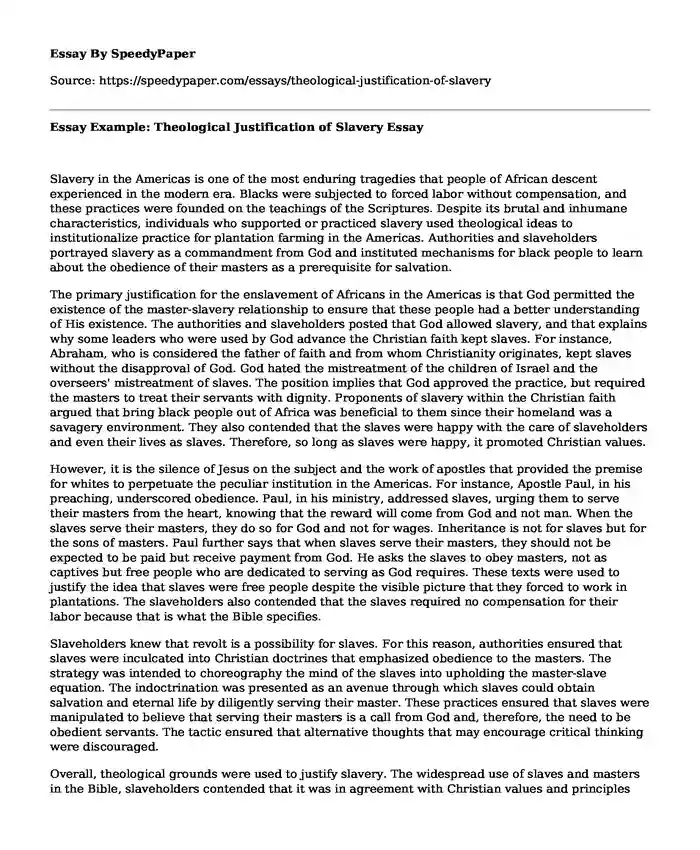
| Type of paper: | Essay |
| Categories: | Slavery Christianity American history |
| Pages: | 3 |
| Wordcount: | 623 words |
Slavery in the Americas is one of the most enduring tragedies that people of African descent experienced in the modern era. Blacks were subjected to forced labor without compensation, and these practices were founded on the teachings of the Scriptures. Despite its brutal and inhumane characteristics, individuals who supported or practiced slavery used theological ideas to institutionalize practice for plantation farming in the Americas. Authorities and slaveholders portrayed slavery as a commandment from God and instituted mechanisms for black people to learn about the obedience of their masters as a prerequisite for salvation.
The primary justification for the enslavement of Africans in the Americas is that God permitted the existence of the master-slavery relationship to ensure that these people had a better understanding of His existence. The authorities and slaveholders posted that God allowed slavery, and that explains why some leaders who were used by God advance the Christian faith kept slaves. For instance, Abraham, who is considered the father of faith and from whom Christianity originates, kept slaves without the disapproval of God. God hated the mistreatment of the children of Israel and the overseers' mistreatment of slaves. The position implies that God approved the practice, but required the masters to treat their servants with dignity. Proponents of slavery within the Christian faith argued that bring black people out of Africa was beneficial to them since their homeland was a savagery environment. They also contended that the slaves were happy with the care of slaveholders and even their lives as slaves. Therefore, so long as slaves were happy, it promoted Christian values.
However, it is the silence of Jesus on the subject and the work of apostles that provided the premise for whites to perpetuate the peculiar institution in the Americas. For instance, Apostle Paul, in his preaching, underscored obedience. Paul, in his ministry, addressed slaves, urging them to serve their masters from the heart, knowing that the reward will come from God and not man. When the slaves serve their masters, they do so for God and not for wages. Inheritance is not for slaves but for the sons of masters. Paul further says that when slaves serve their masters, they should not be expected to be paid but receive payment from God. He asks the slaves to obey masters, not as captives but free people who are dedicated to serving as God requires. These texts were used to justify the idea that slaves were free people despite the visible picture that they forced to work in plantations. The slaveholders also contended that the slaves required no compensation for their labor because that is what the Bible specifies.
Slaveholders knew that revolt is a possibility for slaves. For this reason, authorities ensured that slaves were inculcated into Christian doctrines that emphasized obedience to the masters. The strategy was intended to choreography the mind of the slaves into upholding the master-slave equation. The indoctrination was presented as an avenue through which slaves could obtain salvation and eternal life by diligently serving their master. These practices ensured that slaves were manipulated to believe that serving their masters is a call from God and, therefore, the need to be obedient servants. The tactic ensured that alternative thoughts that may encourage critical thinking were discouraged.
Overall, theological grounds were used to justify slavery. The widespread use of slaves and masters in the Bible, slaveholders contended that it was in agreement with Christian values and principles that blacks were enslaved to serve the interests of the whites. The authorities and slaveholders cited the preaching of Paul to qualify the master-slave relationship between whites and blacks. The authorities used the church indoctrinate blacks into accepting the supposed inferiority of their race as a way of preventing dissent.
Cite this page
Essay Example: Theological Justification of Slavery. (2023, Jul 14). Retrieved from https://speedypaper.com/essays/theological-justification-of-slavery
Request Removal
If you are the original author of this essay and no longer wish to have it published on the SpeedyPaper website, please click below to request its removal:
- Free Essay on Diversity in Life
- Free Essay on Gender Diversity and Effective Leadership
- Free Essay. Immigration Behind the Buster
- Free Essay - Building Strong Relationships
- Terrorism in US: Assessing the Growing Menace (Jones et al., 2020)
- Indigenous People and the Politics of Recognitions - Essay Sample
- Essay Example on Senator Daniel Sullivan: Policies, Politics, and Social Media Impact
Popular categories




